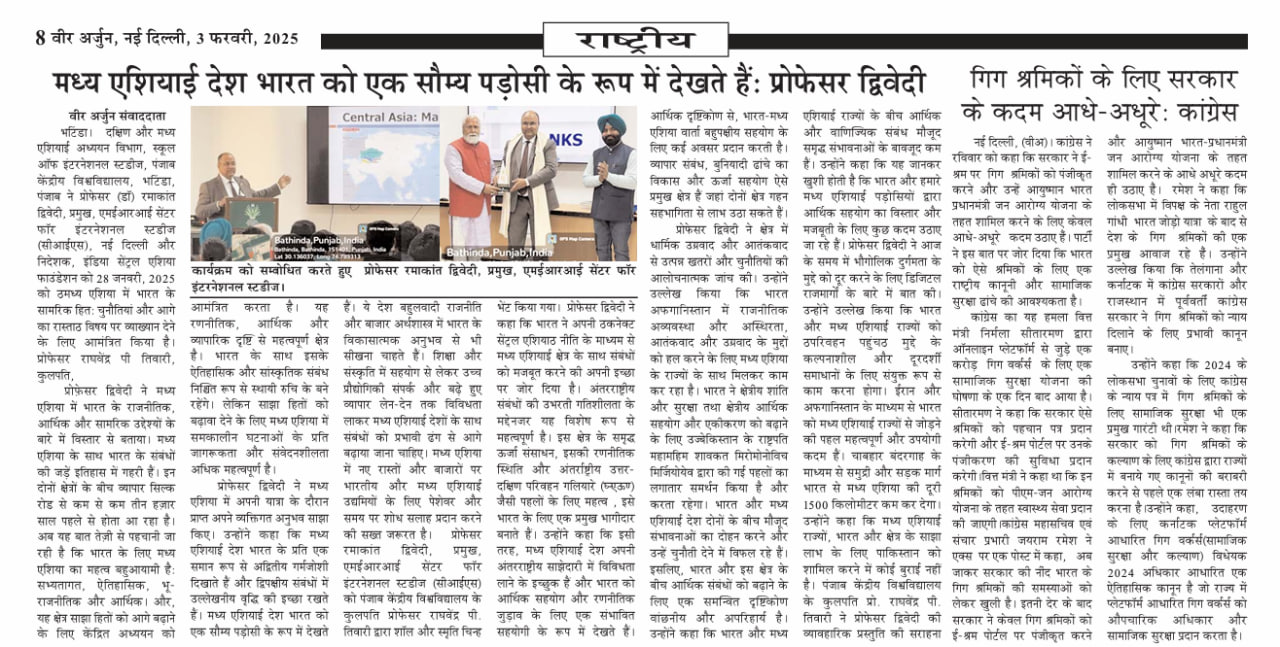
We are brought to your attention the article "India's Strategic Interests in Central Asia: Challenges and the Way Ahead" by Prof. Ramakant Dwivedi, Director of the India Central Asia Foundation and Head of the MERI Centre for International Studies. He delivered it in his lecture at Central University of Punjab, India.
Prof Ramakant Dwivedi was co-editor of the book “India-Uzbekistan: Perspectives on Connectivity between South and Central Asia” which was published by the Diplomatic Academy at the UWED and the India Central Asia Foundation. The report about the lecture at Central University of Punjab on Jan 28, 2025 was published in English and Hindi languages in New Delhi.
Bhatinda: January 29, 2025, Department of South and Central Asian Studies, School of International Studies, Central University of Punjab, Bhathinda, Punjab has invited Prof (Dr) Ramakant Dwivedi, Head, MERI Centre for International Studies (CIS), New Delhi and Director, India Central Asia Foundation to deliver a special lecture on “India’s Strategic Interests in Central Asia: Challenges and the Way Ahead” on Tuesday January 28, 2025. Prof Ragvendra P Tiwari, Vice Chancellor, Central University of Punjab chaired the session.
Prof Dwivedi elaborated India’s political, economic and strategic objectives in Central Asia. India’s connection with Central Asia has deep roots in history. Trade between these two regions predates the Silk Road by at least three thousand years. It is well recognized that the importance of Central Asia to India is multidimensional: civilizational, historical, geopolitical and economic. To further shared interests, the region encourages targeted research. It is an area vital in strategic, economic and trade terms. Its historical and cultural linkages with India would, of course, continue to be of abiding importance. However, fostering a shared interest requires greater sensitivity to and knowledge of current events in Central Asia.
Prof Dwivedi shared his personal experiences gained during his travels in Central Asia. He said that Central Asian States uniformly display unique warmth towards India and a desire for significant increase in bilateral interactions. Central Asian see India as a benign neighbour. These countries also desire to learn from India’s developmental experience in pluralist politics and market economics. Relations with Central Asia countries deserve to be effectively advanced by diversifying from cooperation in education and culture to high technology interactions and enhanced business transactions. There is a firm need to provide professional and timely research advisories for Indian and Central Asian entrepreneurs on the new pathways and markets in Central Asia and India.
Prof Dwivedi said that India, through its "Connect Central Asia" policy , has emphasised its desire to strengthen relations with the Central Asian region. This is particularly important in light of the evolving dynamics of international relations. The region's rich energy resources, its strategic location and importance for initiatives such as the International North-South Transport Corridor (INSTC) , make it a key partner for India. Similarly, Central Asian countries are keen to diversify their international partnerships and see India as a potential ally for economic cooperation and strategic engagement, he added. It is well reflected in multi-vector policies of Central Asian States.
From an economic perspective, the India-Central Asia dialogue offers many opportunities for multilateral cooperation. Trade linkages, infrastructure development and energy cooperation are key areas where both regions can benefit from deeper engagement.
Prof Dwivedi critically examined the threats and challenges posed by religious extremism and terrorism to the region. He mentioned that India has been working together with Central Asia states to address the issues of political disorder and instability in Afghanistan, terrorism and extremism. India has consistently endorsed and continues to support the initiatives taken by President of Uzbekistan Excellency Shavkat Miromonovich Mirziyoyev for regional peace and security and enhancing regional economic cooperation and integration.
The potential that exists between India and the countries of Central Asia has not been fully utilized or challenged. Hence, a coordinated approach is desirable and inevitable to enhance the economic ties between India and this region. He said that economic and commercial ties between India and the Central Asian states are rather low despite the rich potential that exists. It is heartening to note that some steps are being taken by both India and our Central Asian countries to expand and strengthen economic cooperation, he added. Prof Dwivedi talked about digital highways to overcome the issue of geographical inaccessibility in today’s times. He mentioned that both India and Central Asian States have to jointly work for imaginative and farsighted solutions to the “transportation access” issue. The initiatives to link India through Iran and Afghanistan to the Central Asian States are important and useful steps. The sea and road route through the port of Chahbahar will reduce the distance from India to Central Asia by 1500 km. No harm getting Pakistan on board to the common benefit of the Central Asian States, India and region, he added.
Prof. Raghavendra P. Tiwari, Vice-Chancellor, Central University of Punjab, appreciated Prof Dwivedi for his insightful presentation and presented shawl and a memento to him. He emphasized the need of dialogue to overcome and address many crises and conflicts in today’s world. More than 70 students from School of International Studies of Punjab Central University and faculties were present in the lecture.